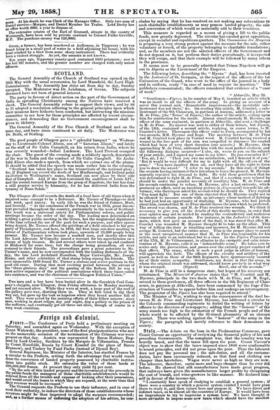SCOTLAND.
The General Assembly of the Church of Scotland was opened on the 20th May with the usual ceremonies, by Lord Mansfield, the Lord High Commissioner. The Assembly has since sat from day to day, Sunday excepted. The Moderator was Dr. Leishmau, of Govan. The subjects discussed have not been of general interest.
The party in favour of direct action on the part of the Government of India in spreading Christianity among the Natives have received a check. The General Assembly refuse to support their views, and by 86 to 31 adopted a resolution adhering to the general principles upon which their missions have hitherto been conducted, but instructing the missions committee to see how far those principles are affected by recent circum- stances, and demanding that no Government encouragement shall be given to idolatry.
The General Assembly of the Free Church of Scotland met on the same day, and have since continued to sit daily. The Moderator was Dr. Beith, of Stirling. •
The good people of Glasgow gave a " splendid banquet" on Wednes- day to Lieutenant-Colonel Alison, son of " historian Alison," and lately on the staff of Sir Colin Campbell, on his return from India, where he was severely wounded—before Lucknow. The Lord Provost occupied the chair. The guest of the evening made a soldierly speech, descriptive of the war in India and the conduct of Sir Colin Campbell. Sir Archi- bald Alison also made a speech, from which we extract one of the plums. It should be added that the speech was made rather late in the evening.
"Scotland has taken her place in the triumvirate of the national glory ; for, if England can record the deeds of her Marlborough, and Ireland point exultation to Wellington's name, Scotland can now place by their side that of Campbell. And if the first restrained the ambition of Louis XIV., and the second rescued Europe from the grasp of Napoleon, the last has done a still greater service to humanity, for he has delivered India from the tyranny of Nana Sahib."
The Glasgow Herald records the death of a local hero of old times when it required some courage to be a Reformer. Mr. Turner of Thrushgrove died lastweek, aged ninety. In early life he was the friend of Muir, and Gerrald. " At the conclusion of the French war in 1815, great Palmer,discon- tent prevailed throughout the country, particularly iu the west of Scotland. The result was a universal outcry for Parliamentary reform, and public meetings became the order of the day. The leading men determined on holding a great public meeting in the Green, but the magisterial dignitaries of the time refused the use of the park for such a purpose, and other spaces being denied, Mr. Turner offered the privilege of a field attached to his pro- perty of Thrushgrove' and here, in 1816, the first large out-door meeting in favour of Parliamentary reform took place, upwards of 23,000 people being present. Mr. Turner now became a marked man, and shortly after this the Lord Advocate M'Conochy issued a warrant for his apprehension on a charge of high treason. He and several others were taken up and confined in Bridewell for some time, but the charge being groundless, all were restored to their friends. The proceedings gave a great notoriety to Mr. Turner's name, and he now corresponded with the leading Reformers of the day, the late Lord Archibald Hamilton, Major Cartwright, Mr. Joseph Hume, and other celebrities of that stamp being among his friends. The ever memorable 1830 found Mr. Turner a zealous and active partisan in the good old cause. During that most exciting period between the advent of the three glorious days' and the passing of the Reform Bill he was a most active organizer of the political associations which those times called into existence, and was the chairman of the Glasgow Political Union."
Two men and a boy have been buried alive in the Garnkirk Coal Com- pany's claypits, near Glasgow, from Friday afternoon to Monday morning, and yet rescued alive. While they were at work, a large part of the roof of the gallery gave way, shutting them in. They at first tried to dig their way out, but gave up the task as hopeless when they heard another fall of roof, They were saved by the untiring efforts of their fellow miners : sixty men, working in short relays, day and night, dug a gallery to the prison of the sufferers, and eventually got all three out alive, though of course in a very weak condition.


























 Previous page
Previous page